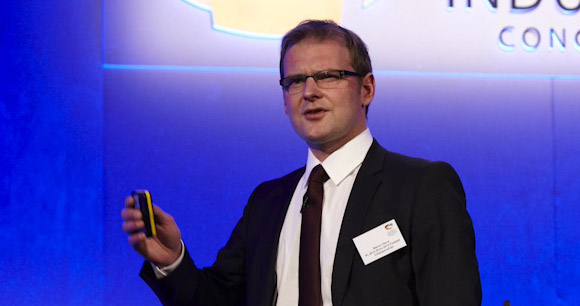MARCIN HERRA – Chairman, Poland 2012
December 7, 2010
Marcin Herra is the Chairman of the PL.2012 Board – the company responsible for leading, coordinating and supervising activities associated with the preparation of UEFA EURO 2012™ football tournament in Poland.
|
asAge: 36
asNationality: Polish asLanguages: Polish, English, Russian asFavourite Team / Individual:
asMemorable Sporting Event: UEFA EURO 2008 and especially celebration of Dutch football fans before astheir national team game in Bern, Switzerland (UEFA EURO 2008) |
How did you go from selling petrol at a service station to becoming the President of the Board for PL.2012?
I graduated in law studies and MBA studies. My professional career started in 1995 at service station selling petrol in Polish oil company Lotos Group. I managed to quickly work in the headquarters of Lotos Group, where
I was Marketing Manager, then Sales and Marketing Division Manager of Stacje Paliw Rafinerii Gdańskiej Sp z o.o. (LLC). From 2001 I held the position of a Development and Operations Director for Lotos Paliwa Sp. z o.o. and 2002 – 2005 I was this company’s Chairman of the Board. During 2005-2006 I was the Exploration and Development General Managers’ attorney for the LOTOS SA Group. I then went through intensive management training at Shell Global Solutions headquarters in Holland. In November 2007, I took over as the attorney to the Managing Director of Sales at the Lotos Group SA. Since 6 February 2008 I have been a Chairman of the PL.2012 Board.
I have wide experience in management and business. The process of preparations and organization of Euro 2012 in Poland is a very demanding and difficult project. From the very beginning for us it was a project which required coordinated and well planned managing. Because of this fact, PL.2012 is a government, special purpose company which has a business and expert profile. All employees are experts in selected areas and have wide experience in business and management. Our management of the preparation process is based on a modern project portfolio management system.
The European Championships in 2012 are a joint venture between the Ukraine and Poland. What were the challenges of a joint bid with the Ukraine?
During the bid process and currently we are working together on the scenario: two Host Countries – one Tournament. The biggest challenge was to coordinate and integrate main areas of the preparations in both countries to be well prepared in June 2012. On 30 September 2010 we signed the Road Map, a special document consisting of 26 projects between the Polish and Ukrainian side. In order to successfully hold EURO 2012, all of them should be jointly implemented by Ukraine and Poland. These projects are related to the security at border checkpoints, organization of medical services and cooperation in information exchange between countries and in the promotional campaign for EURO 2012.
What have been the main infrastructure changes in Poland in preparation for the Championships in 2012?
Poland is currently the biggest building site in Europe. The process of preparations and organizing Euro 2012 is a huge stimulant of infrastructure development in Poland. We are currently implementing 216 infrastructural projects. The number of those with key status is 45, and 36 are important within the context of the organization of the tournament. The most important infrastructure projects are: construction and modernization of stadiums, reconstruction and development of airports, modernization of railway and building facilities for motorway and railway communications between Euro 2012 cities, just the same as in the cities themselves. All these projects are presently on average at the 84% level in accordance with the implementation schedule or with minimal risk, with no threat to the accomplishment before Euro 2012. The total cost of Poland’s key and important infrastructure projects for Euro 2012 is 80bn zlotys. These are investments, which were planned and necessary in Poland even without organizing the tournament but Euro 2012 has affected this realization by implementing the investments 3-4 years earlier.
What is Poland doing to make sure there are going to be no white elephants after Euro 2012 has finished? Will the four new stadiums that are being built in Poland for the Euro 2012 Championships – have the naming rights sold to sponsor’s after the tournament?
All infrastructure investments were planned and necessary in Poland even without organizing Euro 2012. The majority of transport investments will be finished 3-4 years earlier than without Euro 2012. In some cases there’s even more acceleration.
The stadia, which are being built, were also necessary in terms of the sport infrastructure development in Poland. The main idea was not to build big capacity objects just for one tournament, but to build multifunctional arenas, where sport events will only be an aspect of their activity. Stadiums have to be active and earn money 365 days a year. Because of this fact our stadia will offer functions such as organizing business parties, concerts, weddings and others events. It was our idea from the very beginning and referring to it, all stadia will be managed by specialized companies from the venue management sector. Objects in Warsaw, Wroclaw and Gdańsk have already chosen such operators. In the case of the Poznań Stadium, the decision in terms of its operator will be made at the end of 2010.


